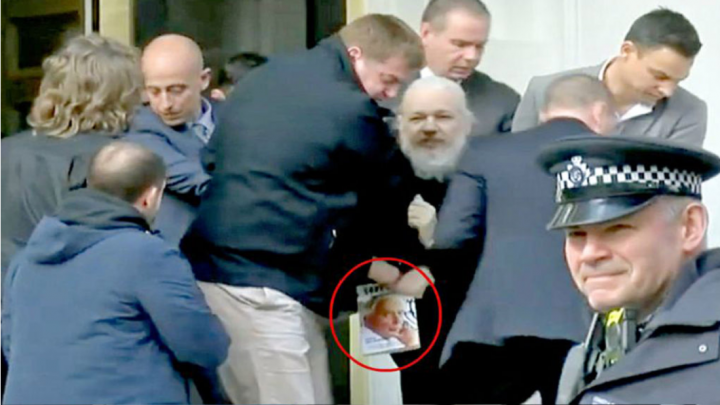…The American empire is not good for the American people. The way it’s sold to the American people is that this is good for all Americans… but it’s quite the opposite: it’s good for an elite, especially arms manufacturers and the fossil fuel industry…
by Brandon Soderberg,
originally published on The Real NewsNetwork, 12/04/2019
As police pulled Julian Assange out of the the Ecuadorian Embassy in London, the Wikileaks founder held on to a copy of “Gore Vidal: History of the National Security State,” a collection of interviews the late author and critic of the security state did with Paul Jay, CEO and editor-in-chief of The Real News Network.
Assange was indicted by the U.S. government for allegedly in 2010 helping Chelsea Manning crack a password code on a Defense Department computer to unearth restricted classified documents, exposing horrifying war crimes and raising the transparency organization’s profile significantly. The message behind Assange holding the book—a persistent topic of internet conversation since yesterday—is quite clear, Jay told The Real News Network’s Marc Steiner.
“I think it was deliberate, obviously. He’s known that he was going to be arrested for quite some time, and certainly in the last couple of days it was just a question of when,” Jay said. “I’ve never met or talked to Julian. But I’m assuming he did it with some intent and I think it’s to send the message that this is the national security state that has come for him, and that the national security state is a dangerous thing for people and they should be aware of it.”
Since Assange’s arrest, “Gore Vidal: History of the National Security State,” a collection of interviews Jay conducted with the late writer between 2005-2007 and published in 2014, has made it to Amazon’s Bestseller list, and has lead to coverage in the Associated Press and Washington Post.
In an interview with the Post, Jay expounded on Vidal’s arguments in the book and used his position on the periphery of the largest news story in the world right now to critique American empire in a mainstream newspaper in no uncertain terms.
“I guess the fundamental point of what Vidal was saying is that the American empire is not good for the American people. The way it’s sold to the American people is that this is good for all Americans because we’re all in the same boat, but it’s quite the opposite. It’s good for an elite, especially arms manufacturers and the fossil fuel industry and others that cash in on this kind of foreign policy,” Jay told the Washington Post’s Stephanie Merry. “But it’s young working people, men and women, that die for this, and they go off and die in these foreign wars while people that are making literally billions can thank them for their service. The level of hypocrisy is beyond belief. This is what Gore was really going after with the series, the way patriotism is sold to people and that it’s really a fraud.”
Vidal, a noted writer, playwright, and pundit, never wavered in his criticisms even as the country and media veered even further to the right. He saw The Real News Network as a crucial counter to journalism serving elites and upholding power: “I don’t think we’ll ever get to know the people’s voice, and the people have no voice because they have no information,” Vidal told Jay amid their many, marathon interviews. “That is why you’re doing useful work here.”
What happened to Assange, Jay told Merry, would be like charging the Washington Post for publishing the Pentagon Papers. More important than newfound interest in his book is that the image sparking it is of a whistleblower taken out of an embassy in handcuffs, about to face criminal charges for exposing the truth.
“It’s not just an attack on press freedom, which it is. It’s not just a way to intimidate journalists and news organizations from accepting leaked material, which it is,” Jay told Steiner. “But it’s saying even if you’re exposing war crimes, we’re coming after you.”










